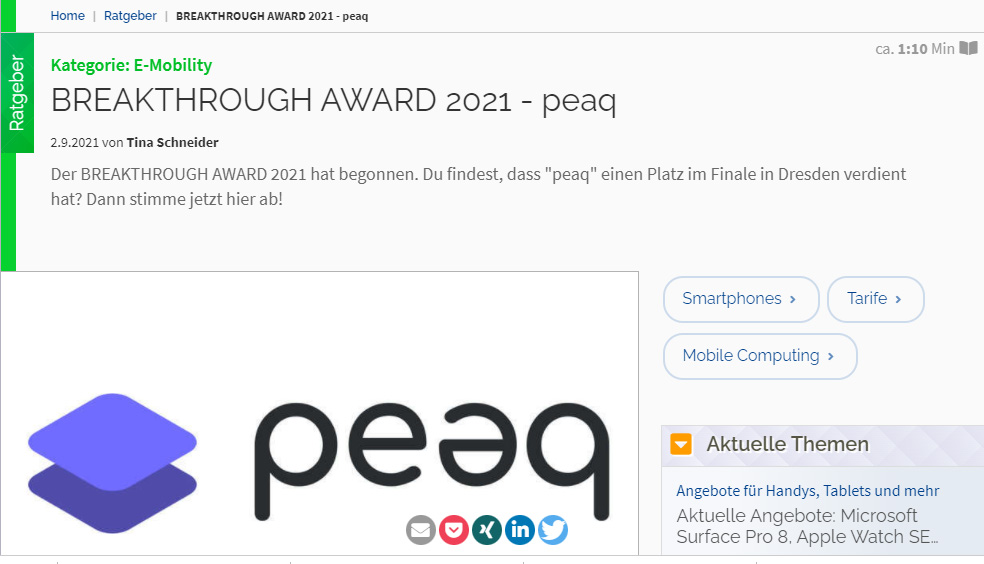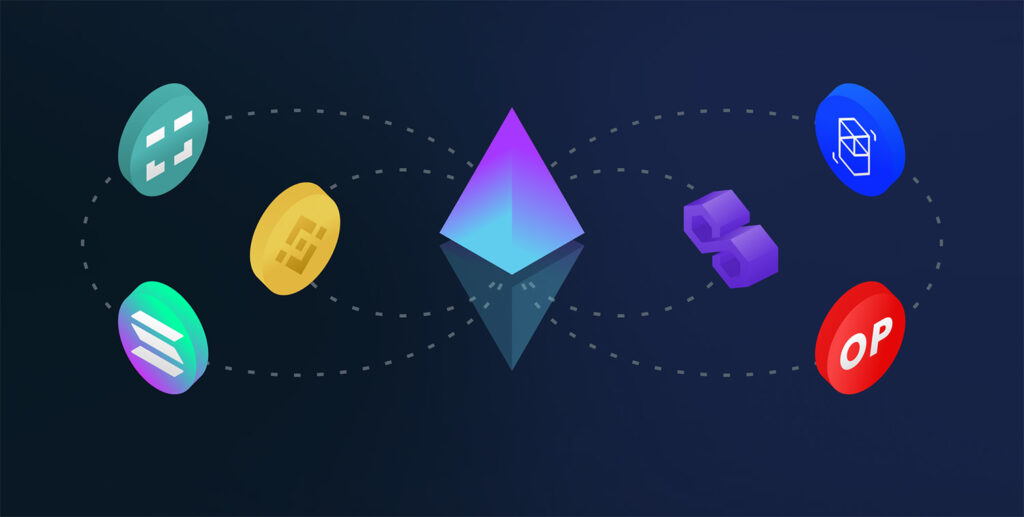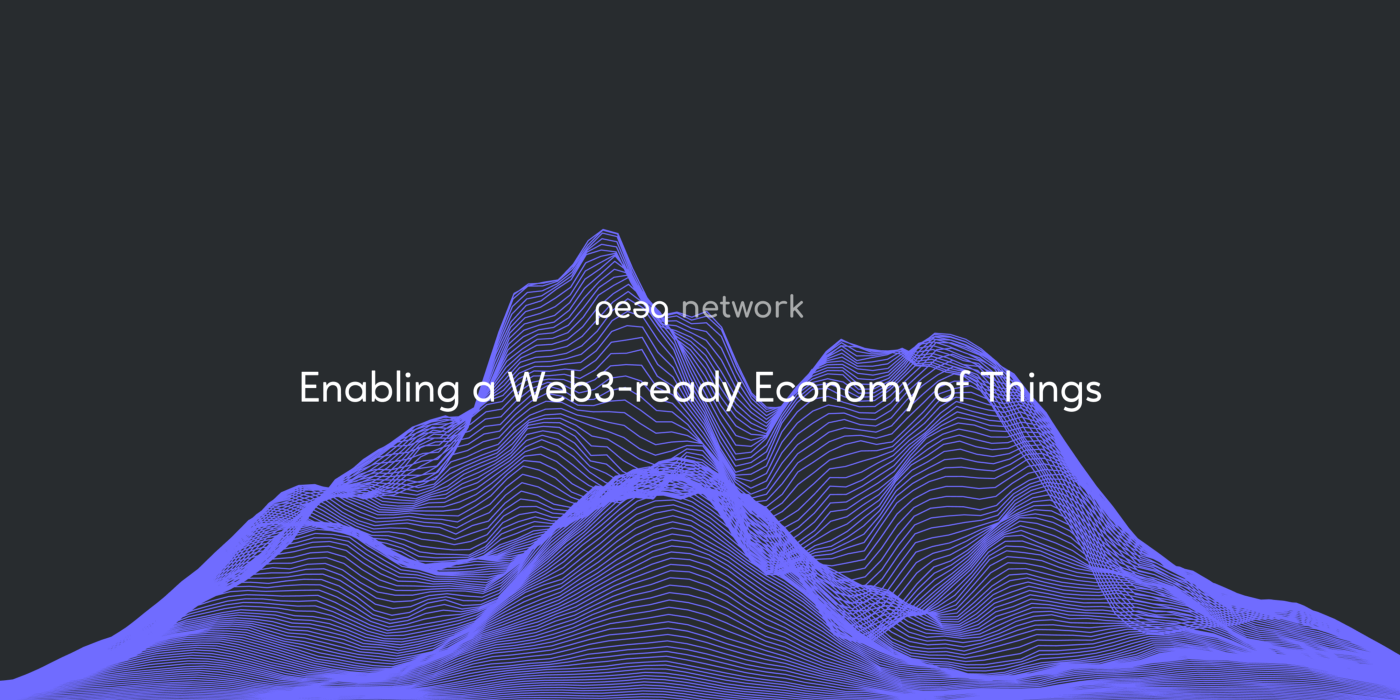There are far too many people who rely on the internet for it to be in the hands of a few large corporations. This is why I’m bullish on the decentralized web. Recently, I stumbled upon a Web3 company that is doing something quite different and awesome. The company’s name is Peaq. You might not have heard of them, but Peaq was founded by Julia Poenitzsch (CFO) and Max Thake (CMO) in 2017, with her headquarters in Berlin.
Peaq allows businesses to create decentralized applications that allow machines to solve problems, save resources, and assist humans.
So far Peaq has raised €3.3m from Scherzer & Co. AG, Werner Geissler, Meteoric VC. When Peaq initially launched in 2017, they were mostly working on blockchain for enterprise space in the IoT and mobility fields. This period came with a lot of collaboration with several Fortune 100 companies on a wide range of use cases, from secure access control with NTT to decentralized charging.
Peaq also bagged the 2021 breakthrough awards and became the first blockchain company to become an official member of Germany’s VDA.

Peaq also signed a Memorandum of Understanding with a prominent German auto company. This contract delineates the mass production of a full-scale e-mobility based off of the DAGchain® and designed for use within the automotive industry. The platform entails making the next generation of cars fully DLT-ready (Distributed Ledger Technology) from the factory, while dramatically reducing range anxiety for EVs across the industry.
Peaq also joined MOBI, the largest blockchain-focused mobility consortium that aims to build the new economy of movement by bringing together some of the largest and most influential mobility players.
Blockchain is well-known for having congestion and scalability issues. This has far-reaching consequences, including slower transaction processing times and higher transaction fees, resulting in a poor user experience.
This is particularly noticeable in the case of Ethereum, the second largest blockchain network after Bitcoin. As a result, some developers have become so frustrated and turned to other networks, such as Solana or Cardano, which provide faster speeds.
For DeFi to continue to gain popularity, traction and become accessible to the masses, cooperation, rather than competition, is the solution. This brings us to a possible solution, which is a multichain ecosystem.

Peaq believes that the future and success of Web3 is multi-chain. A multichain ecosystem, as the name implies, is one in which several blockchains are interconnected with the ultimate goal of improving user experience, increasing efficiency, and allowing for wider adoption. However, effective cross-chain solutions are required.
To prepare for the mass adoption of Web 3.0, which will see an influx of over a billion users, we must be ready to adopt a multichain approach, which will eliminate complex transactions and provide end-users with a frictionless experience.
This makes Peaq adopt the Polkadot mindset. Polkadot attempts to address the limitations of blockchain expandability and scalability by emphasizing interoperability and resource sharing between different chains.
Peaq seeks a parachain slot on the Polkadot network to provide the best possible production environment for the peaq-based decentralized application for the Economy of Things. Polkadot provides the critical layer of security and interoperability beneath peaq.
Interoperability is critical to Web3 success. Peaq is built in this manner using the Substrate framework.
Blockchain interoperability refers to the ability of different blockchain networks to exchange and leverage data with one another, as well as move different types of digital assets between the blockchains of the networks. Once disparate blockchain networks and assets are connected and combined in an interoperable system, they can easily plug into and combine with one another. This network interoperability may enable the development of powerful new products and services that take advantage of the benefits of multiple blockchain networks at the same time. Polkadot enables seamless interoperability with a wide range of other Web3 projects.
Peaq is a Layer 1 network that supports the Web3 Economy of Things. peaq enables the development of decentralized machine applications and incentivizes the conditions for an economy that works for all people and machines. Peaq enables the creation of decentralized applications of all kinds, with an economic model tailored to the machine economy.
Machine NFTs
Peaq leverages decentralization and ownership in the form of machine NFTs. A machine NFT is a non-fungible (unique) machine ownership contract that can be independently verified by anyone. Individual machines or pools (groups) of machines can have NFTs assigned to them.
Web3 is all about verifiable ownership of digital assets on the web, and of physical assets via the web, with this point in mind Peaq is allowing anyone—from investors to machine manufacturers, owners, users, and even machines themselves to own the machines that drive the machine economy, allowing people to directly govern and profit from the machines that serve them. To learn more about Machine NFTs I suggest you read up on it here, Mac Thake the CMO of Peaq did a good job in explaining it.
Self-sovereign machine identity (peaq ID)
Without relying on a centralized third-party, peaq ID allows vehicles, machines, robots, and devices to identify, verify, and authenticate themselves. It is the foundation for any machine-to-machine or machine-to-person interaction in the Web3 Economy of Things. Machines can use peaq ID to:
- Identify themselves with anyone or anything.
- Access management and payment
- storing and proving information about themselves.
Role-Based Access Control (peaq Access)
When interacting and transacting with other machines, people, organizations, and environments, a machine’s identity allows it to securely authenticate itself.
This is the foundation for granting or denying physical and digital access authorization, as well as the exchange of goods and services. Machine owners can use the access function to:
- Manage access to goods and services
- In the real world, you can manage access rights.
- In the digital world, keep track of who has access to what.
Peaq Pay
Payment is required for any transaction involving the purchase or sale of any good or service by machines. peaq enables machines to pay and be paid in a secure and autonomous manner.
The payment feature allows machines to do the following:
- Purchase and pay for goods and services.
- Receiving compensation for providing goods and services
Smart Contracts based on EVM and WASM
Peaq will support Ethereum Virtual Machine (EVM) and WebAssembly (WASM) smart contracts in order to maximize interoperability and provide the best possible smart contract platform for developers building dApps for the Web3 Economy of Things.
Their general vision is to create a machine economy that benefits both humans and machines; Therefore powering a global decentralized. You can read up more on this here



[…] Peaq is the platform where the app will be offered. A decentralized network This will begin in July 2022. According to Dorlöchter, 23 people have been working behind the scenes since 2020. […]